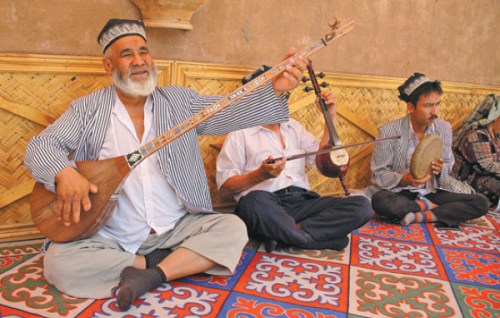
Performers play traditional musical instruments for visitors in Kashgar, the Xinjiang Uygur autonomous region, on Tuesday. (Hu Yongqi/China Daily)
Ramadan is over, and it's time for holiday fun
Ramadan, the monthlong Muslim holy month marked by daily fasting, ended on Saturday with the feast of Eid al-Fitr for the 12 million Muslims in the Xinjiang Uygur autonomous region.
The ninth month of the Islamic calendar, which requires fasting from dawn to sunset, started on June 18. Muslims' five daily prayers can be made at home or mosques, but Muslims in Xinjiang generally pray in mosques during Ramadan.
"Our mosque receives about 1,200 Muslims each day before and after Ramadan. But during Ramadan, more than 3,000 come for prayer each day. The most people we had in a day reached 10,000," said Abdu Rahman, an assistant imam, or prayer leader.
Abdi Ghufur, the muezzin, who calls people to prayer, at Baida Mosque in the regional capital Urumqi, said adult Muslims must fast and pray, but pregnant women, the elderly, children and the sick or injured are not required to participate.
There are more than 24,000 mosques in the region, said Ma Pinyan, a researcher at the Xinjiang Academy of Social Sciences.
Muslims make donations at their mosques when they come to pray. Baida Mosque, like others in Urumqi, hires cooks to prepare food. Alimu, a chef at Hualian Hotel, volunteers to help at the mosque every day after work.
"I help cook food here for four hours, just to do something good," he said.
In Kashgar prefecture, in southern Xinjiang, Muslims spend the days of Ramadan as they do for the rest of the year. Huseyin Sidik, an owner of a hat-making workshop with six workers near downtown Kashgar, said his workshop makes about 50,000 hats a year to earn about 150,000 yuan ($24,190).
The workers always fast and pray each day during this period. "At other times of the year, all workers go back to work after lunch. Ramadan means they don't have any food during the daytime. They take a rest for two or three more hours in the afternoon than usual and then make hats again," Sidik said.
Ramadan moves forward 10 days in the Gregorian calendar each year, and rotates every 36 Gregorian years.
















































